風蕭蕭_Frank
以文會友1...Tharman Shanmugaratnam: Singapore picks a president who could've been much more
2... Singaporeans vote for ceremonial president after rare political scandals
3... Singapore: City-state rocked by rare political scandals
Tharman Shanmugaratnam: Singapore picks a president who could've been much more
https://www.bbc.com/news/world-asia-66643667
By Tessa Wong, Asia Digital Reporter, BBC News, 1 September 2023
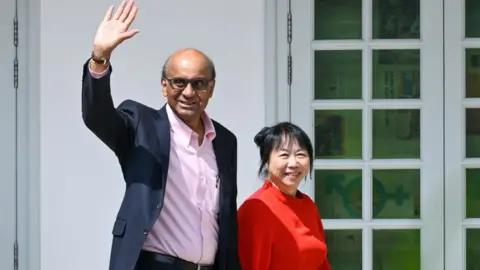 Mr Tharman, seen here with his wife Jane Ittogi, was always the clear frontrunner
Mr Tharman, seen here with his wife Jane Ittogi, was always the clear frontrunnerSingaporeans have chosen Tharman Shanmugaratnam as their next president - but many would have let out a small sigh of disappointment as they did so.
On Friday, the former top minister won a record 70.4% of the votes, comfortably beating two other candidates in the country's first contested presidential election in more than a decade.
Mr Tharman was always the clear frontrunner. Urbane, well-spoken and intelligent, he is highly regarded by Singaporeans and consistently polls as one of the island's most popular politicians.
Which was why, when Mr Tharman announced several months ago he was quitting the ruling People's Action Party (PAP) to run for president, many Singaporeans were baffled by what they viewed as a waste of his potential.
The role of president is a largely ceremonial one that holds little power, apart from having some say on the use of Singapore's sizeable financial reserves. It has even less say in public affairs - the government, which has the power to remove the president, has made it clear the president cannot speak too freely and has likened the role to the British monarch.
It is a figurehead role that many see suitable for a pleasant, uncontroversial person to inhabit, as has been the case with past presidents. But Mr Tharman is much more than that.
Besides helping to helm Singapore's political leadership as finance minister and deputy prime minister, the former economist has also held top council positions at global institutions such as the United Nations and the International Monetary Fund (IMF). At one point, he was even tipped to head the IMF.
Some Singaporeans thought that if he ever left the PAP, he would go on to make his mark in the international arena.
Even more hoped he could be prime minister. A survey some years ago saw him poll as the first choice to become PM after incumbent Lee Hsien Loong steps down. In general elections, Mr Tharman's constituency often scores the highest after Mr Lee's.
Part of this popularity stems from the fact that as a long-time deputy, Mr Tharman's reputation has been shielded from the slings and arrows of public criticism which Mr Lee has had to bear.
But the 66-year-old has also cultivated a gentlemanly image, and has refrained from engaging in personal attacks unlike some other politicians. This has played well with an electorate that likes its leaders genteel and statesmanlike.
Many felt he had the chops and stature to become that almost mythical creature - the first non-Chinese prime minister of Singapore - and break a glass ceiling that the government has long insisted is concrete.
Famous for their racial realpolitik, PAP leaders often reiterate that Singapore, a Chinese-majority country, is not ready to accept a minority PM.
Mr Tharman kept mum on this topic until last week when he said he felt Singapore was ready, sharpening the sting of disappointment among his supporters.
But Mr Tharman has also insisted he would not be good at being PM, and with the PAP's new leadership waiting in the wings, it could be said he was already on his way out. One theory is the PAP wanted him to run for president to help shepherd the next generation of leaders.
And so, he chose to run for president instead. Although Singapore has had non-Chinese presidents in the past, Mr Tharman is the first one voted in by the public.
His supporters could claim his victory as a win for representation and a repudiation of racism. In the lead-up to the election, some social media posts insisted that Singapore must have Chinese leaders. Mr Tharman's two competitors were both Chinese.
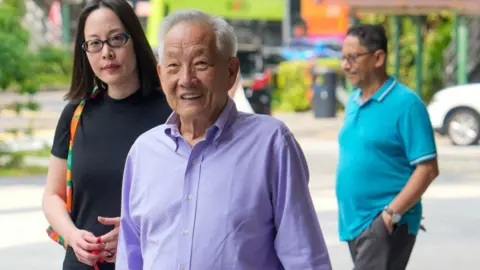 Ng Kok Song came in second behind Mr Tharman, with about 16% of the vote
Ng Kok Song came in second behind Mr Tharman, with about 16% of the vote
Ironically he has also blown apart the argument for a key PAP racial policy.
Prior to the presidential election in 2017, the government passed laws ensuring some polls would be restricted to minority race candidates. They argued the rules were needed to ensure better representation of minorities in Singapore, which include Malays, Indians, and Eurasians.
Those rules did not apply this time, so Mr Tharman has proven that a minority race candidate can win under their own steam - and resoundingly so.
For this reason, his victory "is certainly a win for race relations" in Singapore, said Mathew Mathews, a principal research fellow specialising in race at the Institute of Policy Studies.
But he added that the results "don't necessarily mean that Singapore society is race-blind", as race would likely be a bigger factor in a more even competition. The other candidates had CVs less distinguished than Mr Tharman's, or were less known.
Questions of influence
As with any election in Singapore, this one was seen partly as a referendum on the PAP, which has suffered rare political scandals recently.
Though Mr Tharman's landslide win can be largely attributed to his personal popularity which has always outstripped the PAP's, it also "shows that the party brand is not so toxic such that the association with it drags a person down", noted Walid Jumblatt Abdullah, an assistant professor in social sciences at Nanyang Technological University.
Still, the victory has also been overshadowed by questions about the PAP's influence. Mr Tharman was widely seen as the government-backed candidate.
Though he has insisted he will act independently, few believe this to be true of a man who has been one of the PAP's most loyal team players.
This election also saw renewed disgruntlement over its opaque and restrictive criteria. A potentially popular candidate, George Goh, was disqualified while a more controversial one, Tan Kin Lian, who had been accused of sexism and racism, was let in.
It echoed the 2017 election where the government's changes to the rules provoked anger and controversy.
Mr Tharman's win may have thus deepened the perception that the presidential race is increasingly rigged by the government.
There was even a movement urging Singaporeans to spoil their ballots in protest, though in the end that percentage was around the usual average of 2%, which showed "the overwhelming majority viewed this election worth partaking in and legitimate", Dr Abdullah said.
Mr Tharman ran on a campaign promising "respect for all", including "respect for different views and political leanings".
But it is not certain how he would achieve that as president in a system perceived as perpetuating the PAP's power - a system he helped to shape for decades.
This article has been updated to reflect the following: "In response, the Singapore government said that the qualifications required to run for President are not "opaque". The government added the criteria are spelt out in the Constitution and that its "Presidential Elections Committee issues a certificate of eligibility to applicants who meet the criteria." It also stressed that elections in Singapore are not "rigged" as a "transparent framework under the law has long ensured that elections are conducted freely and fairly in the country".
2... Singaporeans vote for ceremonial president after rare political scandals
https://www.bbc.com/news/world-asia-41237318?
By Frances Mao & Tessa Wong, BBC News, Singapore 31 August 2023
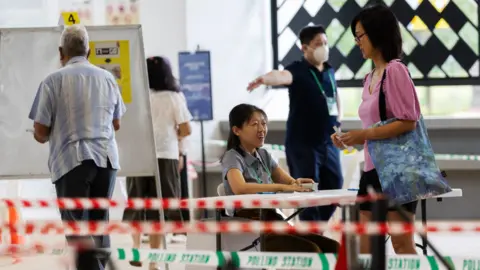 Citizens register to vote at a polling station for the presidential election in Singapore
Citizens register to vote at a polling station for the presidential election in SingaporeSingaporeans have headed to the polls to vote in their first contested presidential election in over a decade.
The president has a mainly ceremonial role in the city-state with few powers and little say in public affairs.
But the result on Friday could be a marker of public sentiment on the long-term ruling People's Action Party (PAP) following a string of MP scandals.
Leading candidate Tharman Shanmugaratnam was a veteran minister of Singapore's PAP.
A former deputy prime minister and finance minister, the 66-year-old economist resigned from the People's Action Party in June to contest the presidential election.
Prime Minister Lee Hsien Loong heads the PAP, which suffered one of its worst electoral showings in 2020 although it still retained more than a two-thirds majority in parliament.
This year the party's reputation has been damaged by a string of rare political scandals including a senior minister's arrest in a corruption probe, as well as two lawmakers' resignations over an extramarital affair.
Voters at polling stations told the BBC on Friday this could influence their vote.
"I think at this election some voters are expressing how they feel about the PAP and some are voting for who they want. It's 50-50 i would say," businesswoman Ms Tong told the BBC.
"But at least this time round people are more aware now of what the president can or cannot do."
The president acts as the custodian of the city's substantial financial reserves so Singapore requires its candidates to have either civil service or corporate experience.
Mr Shanmugaratnam is the frontrunner in the vote, the first to be contested in more than a decade - after outgoing President Halimah Yacob declined to contest a second six-year term.
The other candidates include Tan Kin Lian, a 75-year-old former insurance executive who has been criticised for social media posts he made in the past about women and Indians, and Ng Kok Song, a former wealth fund investment officer.
The candidates' ethnicities in the multicultural but majority-Chinese city-state has been one of the issues too - with some highlighting Mr Shanmugaratnam may become the first non-Chinese president to be elected by voters.
However a voter told the BBC on Friday race was not a factor.
"I always saw it about being the best candidate and not about race," said digital consultant Mr Anthony.
"I think we are far better off than other countries when it comes to race. I won't say we are past race entirely, but we have what it takes to move past it in time."
There has also been consternation among voters about the stringent restrictions on who can run for president.
They must have either served as a senior civil servant or the chief executive of a public company worth at least $500m Singaporean dollars (£292m; $370m).
Voting is compulsory for Singapore's 2.7 million eligible citizens.
3... Singapore: City-state rocked by rare political scandals
https://www.bbc.com/news/world-asia-66230766?
By Kelly Ng, BBC News, Singapore 19 July 2023
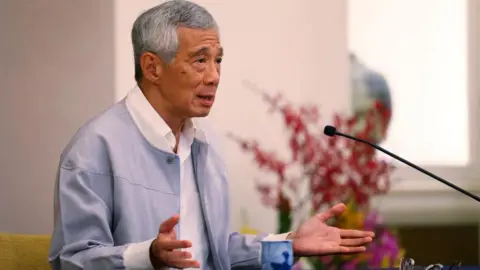 A string of political scandals in Singapore casts doubt on when Prime Minister Lee Hsien Loong can hand over the leadership reins
A string of political scandals in Singapore casts doubt on when Prime Minister Lee Hsien Loong can hand over the leadership reins
Singapore, known for its political stability, has been rocked by a string of rare political scandals.
Last week, a senior minister was arrested in a corruption probe, the first in four decades to be implicated in such an investigation.
And on Monday, two lawmakers - one of them once tipped as a potential prime minister - resigned after it was revealed they were in an extramarital affair.
It has shocked residents of the city-state, which prides itself on its reputation for clean governance and has the highest paid leaders in the world.
Analysts say the unfolding scandals could dent support for the ruling People's Action Party (PAP), which has been in power since 1959 and holds a large majority in parliament.
They also say it casts doubt over when Prime Minister Lee Hsien Loong can hand over the reins of leadership.
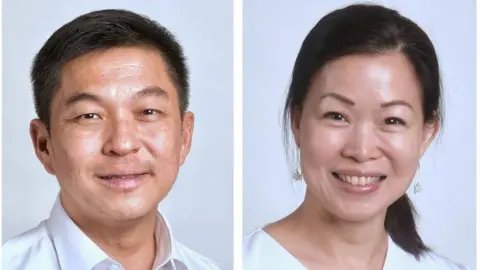 Tan Chuan-jin and Cheng Li Hui resigned over their "inappropriate relationship"
Tan Chuan-jin and Cheng Li Hui resigned over their "inappropriate relationship"
On Monday, Speaker of Parliament Tan Chuan-jin, 54, and fellow lawmaker Cheng Li Hui, 47, resigned from the party and the legislature over their "inappropriate relationship". Mr Tan is married, while Ms Cheng is single.
More questions on transparency arose last week, when Singapore's anti-corruption watchdog arrested Transport Minister S Iswaran and billionaire hotelier Ong Beng Seng. The two men played key roles in bringing the Grand Prix to Singapore in 2008.
Singaporeans were told last Wednesday that Mr Iswaran had been asked to take leave from his ministerial duties amid a probe.
Deputy prime minister Lawrence Wong has told local media the corruption probe would be "full, thorough and independent", and that nothing will be swept under the carpet.
But authorities only announced the arrests three days after they actually took place. Both men have not been charged and are currently out on bail.
The arrests came on the heels of allegations that two other senior ministers had rented colonial-era bungalows in a high-end neighbourhood at below-market rates.
While an anti-graft review cleared the two men, K Shanmugam and Vivian Balakrishnan, of wrongdoing, the matter sparked a heated debate on inequality in Singapore and political optics.
The unusual series of events has bought out the inevitable memes. "The writers of this season of Singapore have really outdone themselves," wrote the creators behind Instagram page yeolo.sg on Monday.
A separate post, featuring actresses on the set of the Barbie movie crowding around a laptop, read: "When me and the girlies are suddenly interested in sg politics."
Another Instagram user wryly compared the current political situation to spilling tea, or sharing gossip.
But beyond the jokes lie serious questions about the future of the PAP and how long it can hold on to Singaporeans' trust.
It has weathered similar scandals in the recent past - in the last decade a previous parliamentary Speaker and a backbencher stepped down because of extramarital affairs. But the close timing of the scandals and corruption probe has heightened voters' scrutiny.
The PAP has long prided itself on demanding high moral standards of its lawmakers, and its ability to keep its house in order. One of its founding members once compared joining the PAP to joining the priesthood.
Mr Lee this week defended his party's handling of the recent scandals, saying it demonstrated "how the system has to function".
"Sometimes things cluster up, but we make sure we put them right," he said, adding that "high standards of propriety and personal conduct… are the fundamental reasons Singaporeans trust and respect the PAP".
But other observers contend these controversies call into question Singapore's - and in particular, the PAP's - claims to exceptional governance.
"I think the biggest questions surround restraints on authority, oversight, transparency, the impartiality of parliamentary process as well as the PAP's claim that it is a sufficient check on itself," said Singapore-based political scientist Ian Chong.
He noted that the PAP has rejected political practices common in other developed jurisdictions, such as public disclosure of income and assets by political office holders, senior civil servants and their immediate family members.
There are no robust mechanisms for holding powerful people to account, added Michael Barr, an Australia-based international relations professor who has written several books on Singapore politics.
"You just have to trust them. That is why this is such a dangerous and novel set of developments for the government. They are trashing their repositories of public trust," he said.
Singapore is ranked the fifth-least corrupt country in Transparency International's latest Corruption Perceptions Index. Over the years, the government has justified seven-figure ministerial pay checks as a way to repress corrupt activity.
But Dr Barr pointed out: "Without extraordinary levels of public trust, the government must rely on one of two things to win elections: either repression and other measures that subvert democracy, or a high level of performance-based legitimacy. Their record in recent years is such that we can forget about performance legitimacy."
The recent events also cast doubt on when Mr Lee would step down.
The 71-year old, who has been prime minister since 2004, has often spoken of his wish to retire. A successor has already been designated: Lawrence Wong, who is also finance minister.
But on Monday, Mr Lee said he has no plans to call for an immediate general election. The next polls are due by November 2025.
The fact that Mr Wong has not been more active and visible in addressing the recent scandals also raises questions about him and his peers' readiness to take over as the city-state's leaders, noted Dr Chong.




